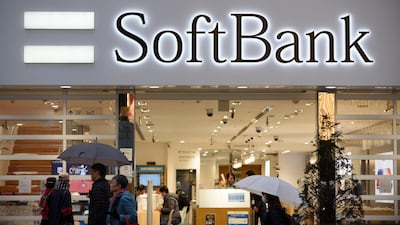The relationship between the high-profile $93 billion SoftBank Vision Fund and government-level Middle East investors including Abu Dhabi's Mubadala Investment Company "will only improve" over the coming 18 months, the fund's chief executive told The National in Barcelona.
Mubadala and Saudi Arabia’s Public Investment Fund have been among the largest investors in the fund, whose high-profile tech investments include ride-sharing apps Uber and Didi Chuxing, Indian e-commerce company Flipkart, and US-based shared workplace provider WeWork.
The ties between the fund and such investors “will only improve as we perform for them”, Rajeev Misra said on the sidelines of the Mobile World Congress in Barcelona.
Mumtalakat, the sovereign wealth fund of Bahrain, is in early discussions to invest in the Vision Fund, Reuters reported last week. The sovereign wealth fund's chief executive Mahmood Alkooheji told The National it was "very interested and very keen" to participate.
Mubadala is one of the largest investors in the Vision Fund, pledging $15bn to the fund last May. The Abu Dhabi-based company subsequently established a venture capital arm in October to oversee its commitment to the Vision Fund and two other investment vehicles.
_____________
Read more:
Didi, Softbank eye Japanese ride-hailing market
Sony steps into Japanese ride-hailing arena
Uber posts $4.5bn loss in fourth quarter despite 61% increase in sales
_____________
Mr Misra declined to comment on whether the fund is in discussions with Mubadala over a fresh investment.
“They’re already a big investor,” he said.
Mr Misra told attendees of a keynote address at the Mobile World Congress that the fund was targeting increasing its portfolio of companies to between 70 and 80 in the next two to three years, up from 30 at present.
The fund is well represented in the US, China and India, but is aiming for additional investment opportunities in Europe, he said
“A lot of our companies are present in Europe … but European domiciled we only have two portfolio companies.
“So we’d like to see more portfolio companies come to us from Europe.”
Mr Misra said the he envisaged greater future collaboration between the four major ride-sharing companies in its portfolio – Uber, China’s Didi Chuxing, 99 of Brazil, and India’s Grab, which together account for around 90 per cent of the total ride-hailer journeys taken everyday globally.
“It doesn’t make sense for them to be competing in certain localised geographies,” said Mr Misra.
He conceded, however, that such efforts to increase collaboration may fall foul of local anti-trust regulations, as well as personality clashes following an often bitter legacy of competition on the ground.
“We’re facilitating conversations between them and we’ll see what happens,” Mr Misra said.
SoftBank became the largest shareholder in Uber in January with the closure of a deal to acquire a stake in the ride-sharing app.
Under the deal announced in October, a SoftBank-led consortium agreed to a large purchase of Uber shares from existing shareholders, alongside a $1.25bn investment of cash in the ride-sharing app.
The investors in the consortium, which also include US-based Sequoia Capital, together now hold 17.5 per cent of the company, with Softbank alone holding 15 per cent.
Mr Misra, who now sits on Uber's board, told CNBC yesterday he supported the US company's plans to list publically in 2019, under plans set out in November by the ride-sharer’s new CEO Dara Khosrowshahi.

